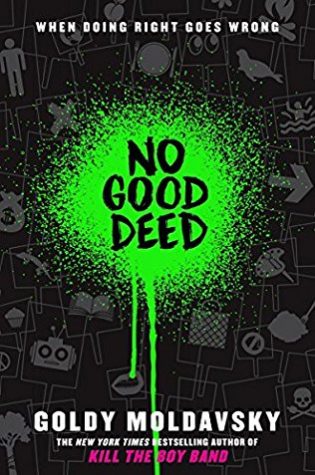Let’s get crazy: a “No Good Deed” review
The satirical mind behind Kill the Boy Band is back with more shenanigans, this time among teen advocates competing for the chance of a lifetime.

When I read Goldy Moldavsky‘s debut novel last year, I had one heck of a good time. “Kill the Boy Band” was a crazy dive into the absolute insanity that can be fangirl culture, but it was also tempered with what good can come out of that same place. Add to that a dangerous mission, a diverse cast of women and enough dark humor to keep me entertained while simultaneously cringing, and I had a blast!
I had no idea Moldavsky would have a follow-up out so quickly, so I was excited to read more of her trademark snark. The summer camp premise, the switch in the protagonist’s gender and a social activist focus right in the middle of this nasty political/YA climate all sounded like fun. I picked this one up right as summer was winding down. It did make me a little nostalgic, but I’m glad I read it now instead of in the middle of the winter. It wouldn’t have fit unless I really wanted an escapist read.
Is “No Good Deed” absolutely bizarre? Yes. That’s why I enjoyed it so much. Moldavsky has a talent for writing absolutely absurd scenes in a delightful way. Nothing makes any sense, and that’s why it works. Granted, this style of humor won’t work for everyone, especially if things being relentlessly mocked for their weaknesses isn’t your forte. However, Moldavsky always remembers to reinforce the positives of what she’s parodying. This time, it’s the social justice movement, summer camp style. How far one is willing to go for the things they believe in, all to win an internship with some tech billionaire, is shown in ridiculous ways. But why people are so passionate about what they want? That’s always shown in a redeeming light, even with caricatures that hit a little too close to home (looking at you, Men’s Rights).

But her strengths don’t stop there. I really found Gregor Maravilla, the protagonist, strong and likable. His evolution from someone who was solely advocating his cause and calling out problems (heteronormativity, offensive things, etic.) to someone who discovered his cause wasn’t the only one to support was appreciated. He realized the other campers had just as worthy dreams for their movements, even if they were a little crazy. Additionally, Gregor was the right mixture of geeky, in way over his head and adorable, which made him more self-aware than a lot of YA protagonists. He realized the flaws in others alongside those in himself.
I also liked his relationship with Ashley Woodstone, the popular Hollywood actress who was briefly mentioned in “Kill the Boy Band” (she was in a relationship with a member of the all-boy group, and it wasn’t pretty). She advocated for eating dirt, which had me howling with laughter every time it appeared on page, but she also didn’t really pay any mind to the cutthroat competition. She was more willing to enjoy her time at camp and have fun. Gregor at first found this very weird, but he grew more tolerant of her when he realized she was the only one who was there when he needed someone to talk to. They always had such amusing conversations and interactions throughout the book.
Also wonderful was that the characters came from rich ethnic backgrounds. From Poe, Gregor’s initial crush who was East Asian, Gregor himself, who was biracial, the African-American “perfect boy” Win Cassidy, Croatian “I Like Paint”, Latin-American Men’s Rights, Unity through Multiculturalism’s Indian-American roots and others throughout, I love that this cast wasn’t filled with all white faces. There were also different sexualities present, so thank you, Moldalvsky, for representing the real world! I do wish some of them got more development. All of them kind of had their own small arcs, but I definitely felt roles could have been expanded.
There were some parts that became too absurd and nonsensical for my tastes and a weird ending that combined both parody and rom-com elements. But if you’re looking for something that’ll make you laugh until you cry, here’s your book. There are some absolutely wonderful moments here that will hopefully continue to be a part of Moldavsky’s absurd comedy writing as she continues to write.
Even with its flaws, “No Good Deed” takes the social justice movement on a ride through Crazy Town, pointing out the ridiculousness of some of it while also showing its true humanity in why people are willing to be a part of it. There’s a solid protagonist, witty writing and enough self-awareness to give this a real dark bite above comedies where no one knows what the heck is going on. Moldavsky knows what she’s doing, and she’s unapologetic. I respect the heck out of that.
Your donation will support the student journalists of West High School. Your contribution will allow us to purchase Scholarship Yearbooks, newsroom equipment and cover our annual website hosting costs.

This is Luke's first and only year as a member of West Side Story. He'll be kept busy with anchoring, editing and reporting, but he's gonna have fun while...


